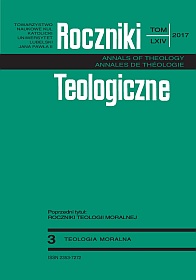Neverending History of the Use of Vaccines Derived from Aborted Infants. Part I: Critique of Teleological Proportionalism and Consequentialism from the Perspective of Moral Theology
Abstrakt
Niekończąca się historia o użyciu szczepionek pochodzących z abortowanych płodów ludzkich. Cz. I: Krytyka teleologicznego proporcjonalizmu i konsekwencjonalizmu z perspektywy teologicznomoralnej
Standardowe i obowiązkowe stosowanie szczepionek pochodzących z abortowanych płodów ludzkich stanowi obecnie istotny problem teologicznomoralny. Rodzi ono poważne dylematy sumienia, gdy osoby uświadamiają sobie istnienie związku pomiędzy jej własnym działaniem i czynem moralnie złym popełnionym przez inną osobę. Warto do tej kwestii powracać tym bardziej, że ma się wrażenie, iż bardzo szybko zapomniano o wskazaniach na ten temat zawartych w dokumencie Papieskiej Akademii Życia pt. Rozważania moralne o szczepionkach przygotowanych z komórek pochodzących z abortowanych płodów ludzkich (05.06.2005). W ocenie moralnej nadal można obserwować przewagę konsekwencjonalizmu i proporcjonalizmu, który odrzuca papieskie Magisterium ordinarium.
Bibliografia
Balák, René. “Mandatory vaccination and conscientious objection”. Forum Teologiczne 15(2014): 67-82.
Balák, René. Mysterium vitae – Život človeka v rukách človeka. II. Kraków: TSP, 2014.
Beiswanger, Christine. A Brief History of IMR-90. Cell Collections 2003/2004: 5-6, (http://c cr.coriell.org/ccr/newsletter/CCRNews.pdf_4.pdf.)
Buttiglione, Rocco. “Jak czytać encyklikę?” In Wokól encykliki “Veritatis splendor”. Ed. Jarosław Merecki, 12-13. Częstochowa, 1994.
Collins, Timothy. “The Vaccination Question”. The Angelus. Journal of Catholic Roman Tradition (February, 2006): 3-13.
Deisher, Theresa et al. “Impact of environmental factors on the prevalence of autistic disorder after 1979”. Journal of Public Health and Epidemiology 6(2014), 9:271-284.
Furton, Edward J. “Vaccines and the Right of Conscience”. The National Catholic Bioethics Quarterly 4.1 (Spring 2004): 53-62.
Geier, David A., Geier, Mark R. “Pediatric MMR Vaccination Safety”. International Pediatrics 18(2003), 2:203-208.
Geier, David A., Geier, Mark R. “A comparative evaluation of the effects of MMR immunization and mercury doses from thimerosal-containing childhood vaccines on the population prevalence of autism”. Med Sci Monit 10(2004): 133-139.
Grabenstein, John D. “Moral Considerations with Certain Viral Vaccines”. Christianity & Pharmacy 2(1999), 2:3-6.
Hayflick, Leonard et al. “Preparation of Poliovirus Vaccines in a Human Fetal Diploid Cell Strain”. American Journal of Hygiene 75(1962) (March): 240-258.
Hayflick, Leonard. Mortality and Immortality at the Cellular Level. A review. (August). San Francisco: University of California, 1997.
Hayflick, Leonard. “The Limited in Vitro Lifetime of Human Diploid Cell Strains.” Experimental Cell Research 37(1965): 611-636.
Hayflick, Leonard, Moorhead, Paul S. “The Serial Cultivation of Human Diploid Cell Strains”. Experimental Cell Research 25(1961) (December): 585-621.
Hayflick, Leonard, Plotkin, Stanley, Stevenson, Roger E. “History of the Acceptance of Human Diploid Cell Strains as Substrates for Human Virus Vaccine Manufacture”. Developments in Biological Standardization 68(1987): 9-17.
Hayflick, Leonard. “History of Cell Substrates Used for Human Biologicals”. Developments in Biological Standardization 70(1989): 11-26.
Hooker, Brian S. “Measles-mumps-rubella vaccination timing and autism among young African American boys: a reanalysis of CDC data”. Translational Neurodegeneration (2014), 3:16.
Hrehová, Helena, “Nové racionálne pochopenia života – bioetika a metafyzika”. Folia universitatis tyrnaviensis 15(2008): 38-42.
Jacobs, Jeffrey P. et al. “Characteristics of a Human Diploid Cell Designated MRC-5”. Nature 227(1970): 168-170.
Jacobs, Jeffrey P., Garrett, A.J., Merton, Rosemary. “Characteristics of a serially propagated human diploid cell designated MRC-9”. Journal of Biological Standardization 7(1979), 2:113-122.
Kern, Janet K. et al. “Evidence of neurodegeneration in autism spectrum disorder”. Translational Neurodegeneration 2(2013): 17.
Kieniewicz, Piotr H. “Gdy nie ma innego wyjścia... Wobec stosowania szczepionek opracowanych przy wykorzystaniu linii komórkowych uzyskanych z abortowanych płodów ludzkich”. Roczniki Teologiczne 53(2006), 3:141-151.
Leiva, René. “A Brief History of Human Diploid Cell Strains”. The National Catholic Bioethics Quarterly (Autumn, 2006): 443-451.
Luño, Angel Rodriguez. “Riflessioni etiche sui vaccini preparati a partire da cellule provenienti da feti umani abortiti”. Medicina e Morale 55(2005), 3:521-530.
Maher, Daniel. “Vaccines, Abortion, and Moral Coherence”. The National Catholic Bioethics Quarterly 2.1 (Spring, 2002): 51-67.
Matlary, Janne H. Ľudské práva ohrozené mocou a relativizmom. Prešov: Vadavateľstvo Michala Vaška, 2007.
Mráz, Marián. Problém utrpenia a jeho riešenie v medicínskej etike. Trnava: Dobrá kniha, 2000.
Mroczkowski, Ireneusz. Natura osoby ludzkiej. Płock: Płocki Instytut Wydawniczy, 2012.
Mroczkowski, Ireneusz. Zło i grzech. Studium filozoficzno-teologiczne. Lublin: RW KUL, 2000.
Nichols W. et al. “Characterization of a New Human Diploid Cell Strain,” IMR-90. Science (April, 1) 196.4285, 1977, 60.
Plich, Robert. “Proporcjonalizm”. In Encyklopedia katolicka, vol. 16, Lublin: TN KUL, 2012, col. 493.
Plotkin, Stanley A. “The History of Rubella and Rubella Vaccination Leading to Elimination”. Clinical Infectious Diseases 43(2006) (Supplement 3):164-168.
Plotkin, Stanley A. Farquhar, John D., Katz, Michael, Buser, Fritz. “Attenuation of RA27/3 rubella virus in WI 38 human diploid cells”. American Journal of Diseases of Children 118(1968): 178-185.
Pruss, Alexander R. “Cooperation with paste evil and use of cell-lines derived from aborted fetuses”. In Cooperation, Complicity & Conscience. Ed. Helen Watt. London: The Linacre Centre, 2005: 89-104.
Ratajczak, Helen V. “Theoretical aspects of autism: Causes—A review”. Journal of Immunotoxicology 8(2011), 1:68-79.
Rogalski, Andrzej. “Konsekwencja”. In Encyklopedia katolicka, vol. 9, col. 678-679.
Schwartz, Jason L., Caplan, Arthur L. “Ethics of vaccination programs”. Current Opinion in Virology 1(2011):1-5.
Sabchareon, Arunee. “A New Vero Cell Rabies Vaccine: Results of a Comparative Trial with Human Diploid Cell Rabies Vaccine in Children”. Clinical Infectious Diseases 29(1999): 141-149.
Styczeń, Tadeusz. “Objawienie zaklada doświadczenie...” In Jan Paweł II. “Evangelium vitae”. Tekst i komentarze. Ed. Tadeusz Styczeń, Janusz Nagórny, 115-133. Lublin: RW KUL, 1997.
Szostek, Andrzej. “Encyklika o «rozeznawaniu duchów, czy są one z Boga»”. In Wokól encykliki „Veritatis splendor” („Biblioteka Niedzieli”, vol. 3). Ed. Jarosław Merecki, 47-48. Częstochowa, 1994.
Vasa, Robert. “Lives are saved, but some vaccine aren't morally neutral”. Catholic Sentinel 19 (February, 2009).
Vinedge, Debra L. Aborted Fetal Cell Line Vaccines and the Catholic Family a Moral and Historical Perspective. Original Appeal Filed with the National Catholic Bioethics Center and the US Conference of Catholic Bishops. October 2005.
Wojtyła, Karol. Miłość i odpowiedzialność. Lublin: TN KUL, 1986.
Wong, Alvin. “The Ethics of HEK 293”. The National Catholic Bioethics Quarterly (Autumn, 2006):473-495.
Copyright (c) 2017 Roczniki Teologiczne

Utwór dostępny jest na licencji Creative Commons Uznanie autorstwa – Użycie niekomercyjne – Bez utworów zależnych 4.0 Międzynarodowe.





